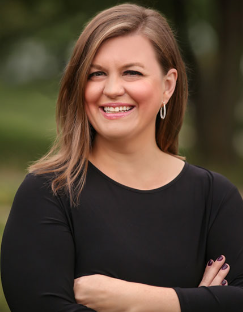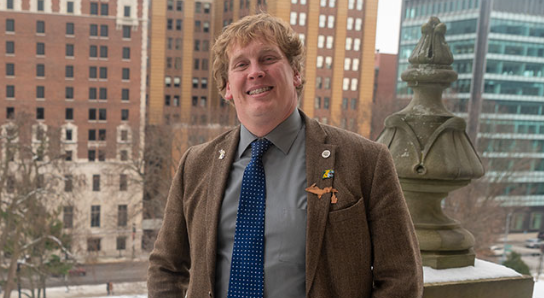
Michigan Community College Association
Michigan Community College Association President Brandy JohnsonBy LIZ NASS
Capital News Service
LANSING — During the pandemic, boards and committees across the nation implemented ways to meet despite the physical barriers COVID-19 created. Now community colleges are hoping to see pandemic meeting flexibility stay for good.
During the pandemic, some boards met through multiple Zoom meetings and got creative with remote technology.
The Open Meetings Act requires governmental boards to meet and vote in public so people can make comments and listen in person.
Gov. Gretchen Whitmer signed an amendment to the law in 2020 that temporarily allowed remote meetings and enabled members to vote over Zoom.
However, that blanket authorization expired last year.
Now, the only exception allows members to vote remotely if they are on active military duty.
Brandy Johnson, the president of the Michigan Community College Association, said community college trustee boards hope to again see some of the flexibility that the 2020 law allowed.
“We must comply with the Open Meetings Act for our trustees to meet, which is great and no one wants that differently, except that during the pandemic there were rules that were suspended to allow boards to meet remotely,” Johnson said. “It turned out that worked out pretty well.”
Johnson said trustees now may join a meeting remotely as listeners if there is a quorum. However, members participating remotely cannot vote.
Johnson said community college trustees want to be allowed to vote remotely under certain circumstances such as sickness or child care problems.
Bruce Gosling, the chair of the Centreville-based Glen Oaks Community College Board of Trustees, said members of his board who were out of town for business or dealing with a parent’s illness missed a meeting every once in a while, yet still wanted to be part of the quorum and to vote.
He said that during the pandemic, such conflicts could be easily avoided under the temporary change in the law and helped boards meet under tough circumstances.
“We could potentially avoid not having a quorum to hold a meeting because that person out of state could join in remotely,” Gosling said.
Reinstating that flexibility “would be making the law keep up with the times,” he said.
Gosling said more than community college boards could benefit from these changes.
While there is currently no such legislation pending or being drafted to reflect the wishes of the community colleges, Sen. Ed McBroom, R-Vulcan, introduced a bill that runs counter to the colleges’ wishes.
McBroom’s legislation would differentiate between “classes” of public bodies and specify when remote voting should be allowed or not allowed.
Community college boards would fall into a category that would not be allowed remote voting.
McBroom said the distinction among boards would be based on whether a body was appointed or elected, whether it has taxing power and whether it can make significant policy changes.
McBroom said because community college boards are elected and have a lot of local pull, they shouldn’t be able to avoid opportunities to meet with and vote in front of the public.
“When they say I’m going to run for this office, they understand that there is going to be an obligation for meeting attendance. If they can’t fulfill that obligation, then they should not run for that job,” McBroom said.
McBroom said that even if board members were allowed to vote remotely only in emergencies, he wants them to do what happens with other jobs when an emergency arises: take the day off.
McBroom said during the pandemic, he saw poor procedures in meetings, such as when members were sitting in the “drive-thru at McDonald’s or on a toilet,” or simply calling in just in time for a vote and then hanging up.
Steve Delie, the executive director of the Michigan Coalition for Open Government, said whether he would support the changes the trustees want would depend on how those changes would be carried out.
Delie said people have become more comfortable with using online meetings as a valid way to connect with one another.
However, Delie said he would want meetings to take place both online and in person so the public has options in how to interact with decision-makers, increasing accessibility.
“You don’t want that the only way that you can attend the meeting (is online), but I think it enhances access if it’s an addition rather than a substitution,” Delie said.
McBroom’s bill is awaiting action in the Senate Oversight Committee.

Michigan Senate
Republican Sen. Ed McBroom of Vulcan.
Glen Oaks Community College
Bruce Gosling, chair of the Glen Oaks Community College Board of Trustees